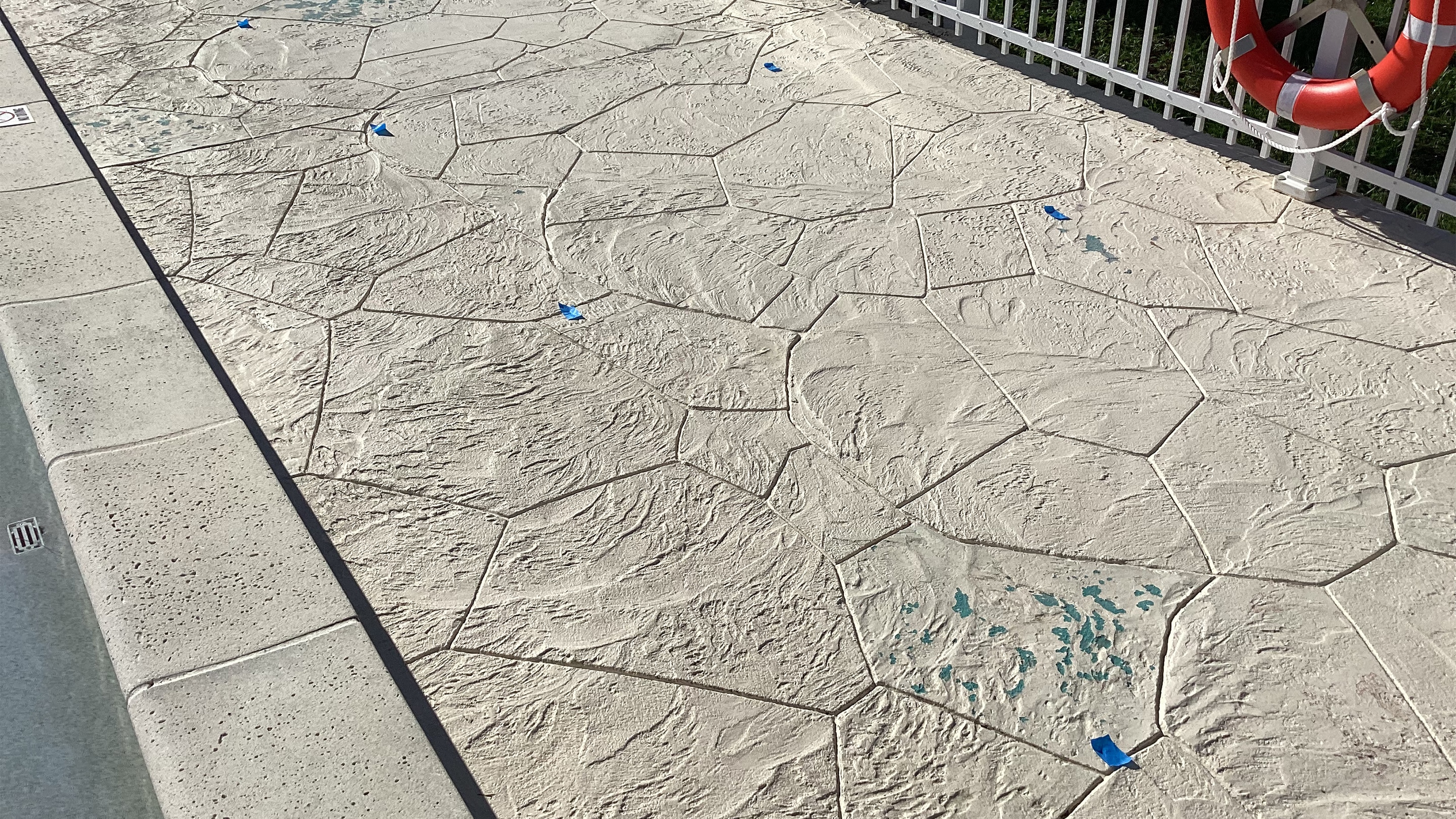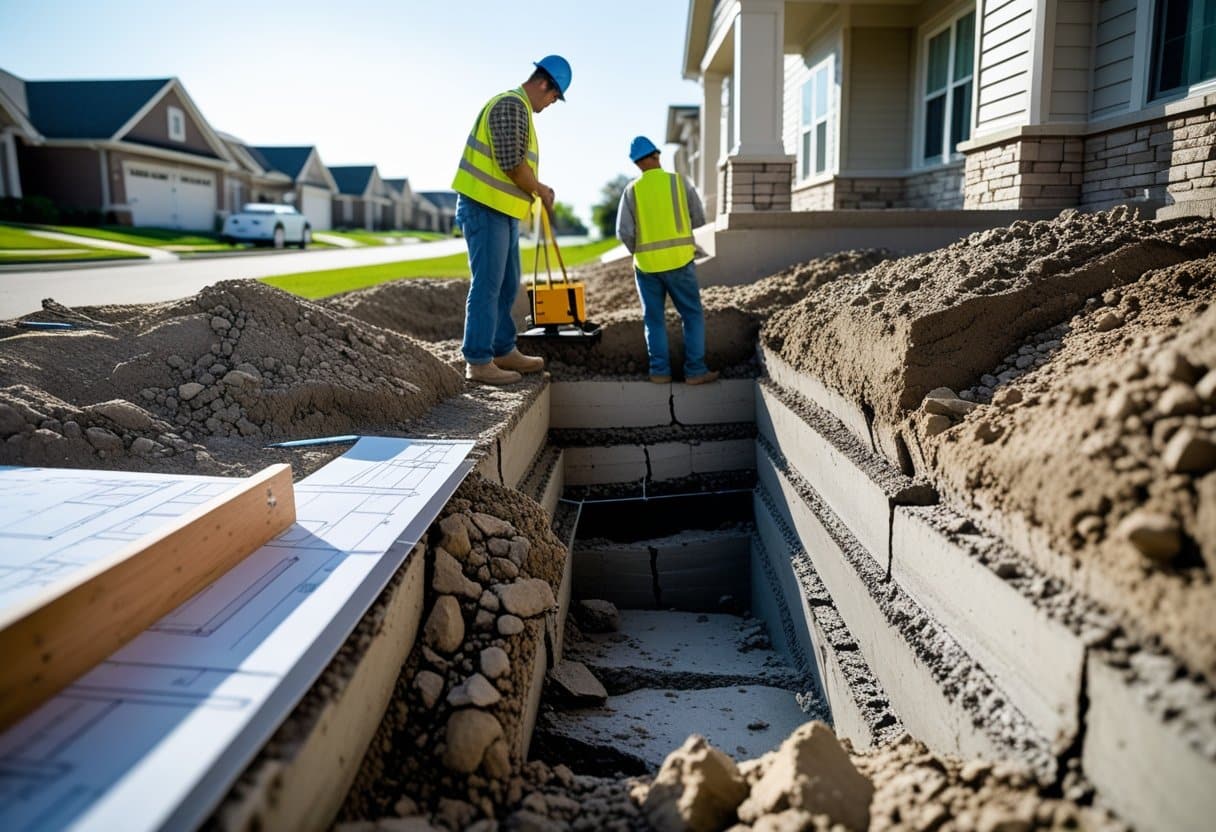Sinkholes aren’t just surface blemishes—they can pose serious risks to your home’s foundation, safety, and long-term value.
In Florida, where sandy soils and subsurface voids are common, compaction grouting has become one of the most effective techniques for stabilizing ground conditions and preventing sinkhole-related damage. This repair method injects dense, low-mobility grout deep into the soil, compacting loose material and filling hidden voids.
The result?
A stronger, more stable foundation beneath your structure, without the need for major excavation.
For over 20 years, Helicon has led the way in Florida with advanced soil stabilization methods like compaction grouting. Whether you’re dealing with early signs of soil movement or need to reinforce your home after confirmed sinkhole activity, our proven techniques offer long-term peace of mind.
In this blog, you’ll learn:
- What compaction grouting is and why it works in Florida soil
- How it compares and complements other repair solutions like chemical grouting
- What to expect from the process, from initial inspection to final stabilization
Let’s start by understanding what makes compaction grouting such a smart foundation solution.
Understanding Compaction Grout Sinkhole Repair
Compaction grouting is a specialized repair method used to stabilize loose, weak, or voided soils beneath homes and other structures, especially in areas impacted by sinkhole activity. Unlike basic fill materials, this technique involves injecting a stiff, cement-based grout deep into the ground to densify the soil and reinforce its load-bearing capacity.
The grout used in this process is low-mobility, meaning it doesn’t flow freely like a liquid. Instead, it pushes the surrounding soil outward as it’s injected under high pressure. This lateral force compacts the ground, fills hidden voids, and increases density—all of which help restore a safe, stable subsurface foundation.
In Florida, where sinkholes often form in sandy soils or limestone-rich terrain, compaction grouting is one of the most trusted solutions for preventing collapse and supporting long-term structural integrity.
We use this method not only to address known sinkholes but also to reinforce areas showing early signs of soil instability, such as depressions, cracking, or uneven settling around your property.
How Compaction and Chemical Grouting Work Together?
In complex soil conditions, especially in Florida’s erosion-prone landscapes, no single repair method fits every situation. That’s why Helicon often combines compaction grouting and chemical polyurethane grouting to deliver the most effective and precise stabilization results.
Here’s how these two methods complement each other:
- Compaction Grouting is ideal for shallow to mid-depth voids. It strengthens the ground by injecting thick, low-mobility grout into weak soil zones. This process compacts surrounding soils and fills larger subsurface gaps, restoring load-bearing strength beneath the affected area.
- Chemical Polyurethane Grouting comes into play when the repair requires sealing narrow fissures, filling deeper or more sensitive voids, or reducing water infiltration. This method involves injecting a lightweight, expanding foam that binds soil particles and fills hard-to-reach gaps that compaction grout can’t penetrate.
Using both techniques in tandem allows us to address soil instability at multiple depths and densities, ensuring a thorough repair that lasts. We tailor this dual approach based on your site’s conditions, always with the goal of restoring both surface and subsurface stability—without unnecessary excavation or disruption.
Where Compaction Grouting Is Used?
Compaction grouting is one of the most versatile soil stabilization techniques available, especially in Florida, where sinkholes and loose soils can appear with little warning. At Helicon, we use this method across a wide range of residential and commercial applications to protect properties from subsurface failure.
Compaction grouting is especially effective in areas where:
- Sinkhole activity is visible or suspected, including depressions in the yard, soft ground, or cracked concrete
- Structures are experiencing settlement, such as uneven patios, driveways, pool decks, or building slabs
- Preventative reinforcement is needed for properties near known sinkhole zones or undergoing major construction
- Heavy machinery access is limited, allowing stabilization without full-scale excavation
Because the technique works underground, it can be used to stabilize soil beneath structures without removing or damaging them, making it ideal for sensitive sites or already-developed properties.
Whether your home shows early warning signs or you’re looking for a permanent solution after confirmed sinkhole activity, compaction grouting offers targeted, efficient reinforcement that works where other methods fall short.
Key Benefits of Compaction Grouting
For Florida homeowners facing unstable ground or sinkhole concerns, compaction grouting offers a reliable and long-lasting solution. It doesn’t just patch a problem—it transforms weak, eroded soil into a strong foundation that can support your home, driveway, or structure for decades.
Here are three key reasons Helicon recommends this method:
1. Soil Densification and Load-Bearing Strength
As grout is injected, it pushes surrounding soil outward, compressing loose materials and eliminating voids. This creates a solid, compacted base that significantly improves ground strength beneath your foundation or slab. In areas with sandy or loosely packed soil, this added density helps prevent future settling or cracking.
2. Long-Term Performance
Once cured, the grout remains in place and maintains its shape, providing permanent support with minimal maintenance. Unlike lighter materials that may shrink or erode over time, our compaction grout is formulated for stability, making it an ideal choice for long-term peace of mind.
3. Low Surface Impact
The equipment used for compaction grouting is compact and precise, requiring only small drill holes to access problem zones. That means your landscaping, walkways, and existing structures remain largely undisturbed throughout the process. It’s a smart solution for maintaining both structural integrity and curb appeal.
What the Process Looks Like: Step-by-Step Breakdown
If you’re considering compaction grouting, it’s helpful to understand what the process involves. Our expert team follows a carefully controlled approach to ensure soil is stabilized effectively—with minimal disruption to your property.
Step 1: Site Evaluation and Repair Planning
Before any work begins, Helicon conducts a thorough inspection of your property, assessing visual signs of soil movement such as depressions, cracks, or shifting structures. Based on those findings, our specialists create a detailed grouting plan, identifying injection points, depths, and pressure settings tailored to your property’s conditions.
Note: If needed, we may coordinate with licensed geotechnical engineers to analyze subsurface conditions for larger or more complex projects.
Step 2: Equipment Setup and Access
Small drill rigs and grout mixers are brought onto the site. Because the machinery is compact, it can be used even in tight residential spaces without damaging landscaping or surrounding structures. Drill casings are installed to guide the grout into the target zones.
Step 3: Precision Grout Injection
High-pressure pumps deliver dense compaction grout into the soil through steel casings.
Technicians control the depth and flow of the material in stages, allowing the grout to compact loose soils and fill hidden voids. This process continues until the target zones show the desired improvement in soil density and stability.
Step 4: Finalization and Surface Restoration
Once the injections are complete, the casings are removed and the injection points are sealed. Helicon restores the surface to its original condition as closely as possible, often completing the project within one to two days, depending on the scale.
When performed by trained professionals, compaction grouting offers minimal surface disruption and maximum subsurface reinforcement, making it one of the most efficient and effective solutions available.
Reinforce Your Property with Confidence
When it comes to protecting your home or property from sinkhole damage, surface-level fixes won’t get the job done.
True peace of mind comes from knowing the ground beneath your feet is solid, and that starts with professional-grade compaction grouting performed by experts who understand Florida’s unique soils.
You’ve now seen how this powerful method densifies weak ground, prevents further erosion, and creates a long-lasting foundation for homes, patios, driveways, and beyond. When paired with chemical grouting, the result is a comprehensive repair strategy that adapts to your property’s needs, whether you’re facing an active sinkhole or want to prevent one from forming.
Helicon has been securing Florida homes for over 20 years. If you’re seeing early warning signs of ground movement—or just want a trusted opinion—schedule your free inspection today.
We’ll assess your situation, walk you through the options, and provide a custom plan to protect your home from the ground up.
Frequently Asked Questions
Sinkhole repair doesn’t have to be mysterious. Here are answers to some common questions Florida homeowners ask about compaction grout—and what makes it the smart choice. Compaction grouting strengthens soil, prevents further damage, and restores peace of mind. Here’s what you should know before starting.
How does compaction grouting work to stabilize soil?
Compaction grout is a thick, low-mobility grout injected under pressure into weak soil. It pushes the loose soil particles closer together and fills empty spaces, creating a dense, solid base below your foundation or slab.
Can I repair a sinkhole myself, or should I call a professional?
Sinkhole repair is a specialized process that requires expert evaluation, equipment, and structural knowledge. DIY attempts often fail to address the full extent of the problem. Helicon offers free inspections and licensed professionals who can recommend a precise, long-term solution built for your property’s soil conditions.
What factors influence the cost of compaction grouting for sinkholes?
Costs vary based on the size and location of the affected area, the depth of the voids, and the amount of material needed. Helicon provides custom quotes following a free inspection. Most structural stabilization solutions start in the few-thousand-dollar range or higher, depending on the complexity of the project.
What are the potential drawbacks of choosing compaction grouting for sinkhole remediation?
Compaction grouting can be expensive compared to other methods. If not done correctly, it may not fully stabilize the soil. Also, it may cause slight ground movement during the process, which needs careful monitoring.
How effective is chemical grouting for soil stabilization compared to compaction grouting?
Chemical grouting uses liquid chemicals that harden and bind soil particles, but may take longer to set. Compaction grouting physically compacts soil for immediate strength. Both have pros and cons depending on soil type and repair needs.
Is purchasing a home with a history of sinkholes that have been repaired with compaction grout a wise decision?
Yes—if the repair was performed by a reputable company like Helicon and properly documented. Compaction grouting is a widely trusted solution in Florida, and many homes with past sinkhole activity remain completely safe and stable after professional remediation. Always review repair records and get an expert inspection before purchase.





